There is a huge range of performance among European bourses since the 2008-2009 crash. In the previous boom, all markets went up together, but these charts show that investors are now much more discriminating, and that there is a huge range of optimism among these countries. Here is a series of 5-year charts from Bloomberg (you can browse lots more charts here):
Greece:
-
Iceland (I’ve never seen a stock index that looks like this – it’s more like the aftermath of a penny stock pump-and-dump):
-
Ireland:
-
Italy:
-
Portugal:
-
France:
-
Luxembourg:
-
Switzerland ![]() I’m surprised that this is not higher, since the economy here is strong, but the Swiss are very conservative and becoming more so, preferring cash and gold to stocks):
I’m surprised that this is not higher, since the economy here is strong, but the Swiss are very conservative and becoming more so, preferring cash and gold to stocks):
Denmark:
Germany (DAX):
-
United Kingdom (FTSE 100):
-
The FTSE and DAX typically trade like the S&P500, shown below for reference:
These higher-quality markets are now very expensive and technically weak, and if they enter into another bear market the lower-quality markets should follow, quickly breaking their 2009 lows. Bottom feeding value investors may then be able to find a few odds and ends in the rubble.


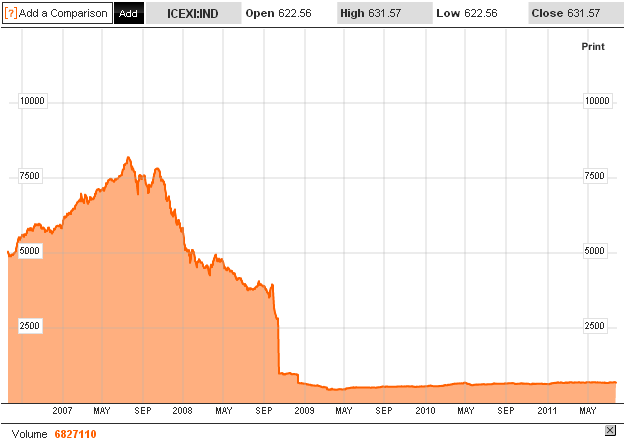

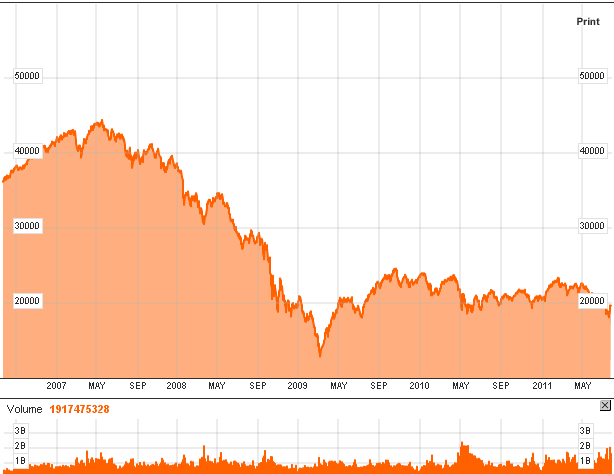
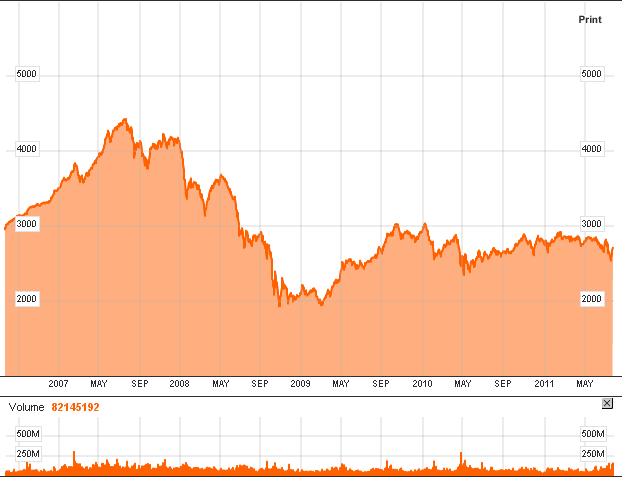
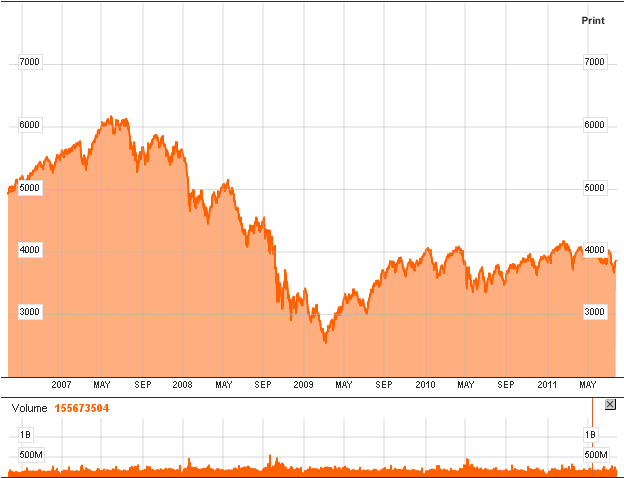
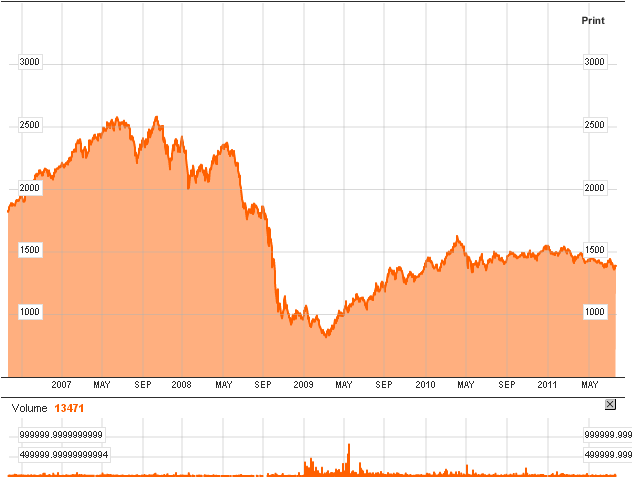

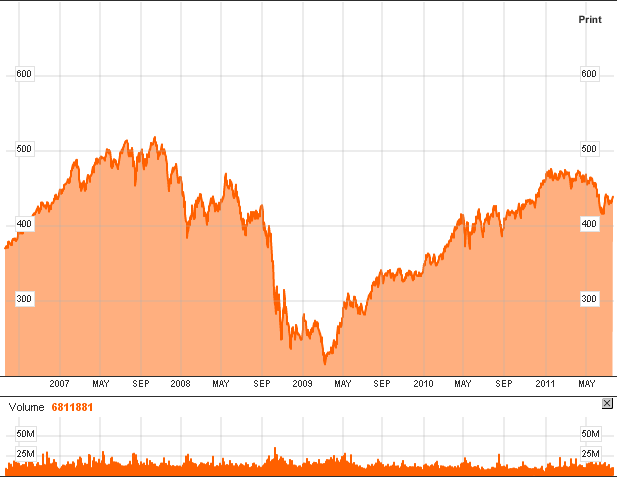
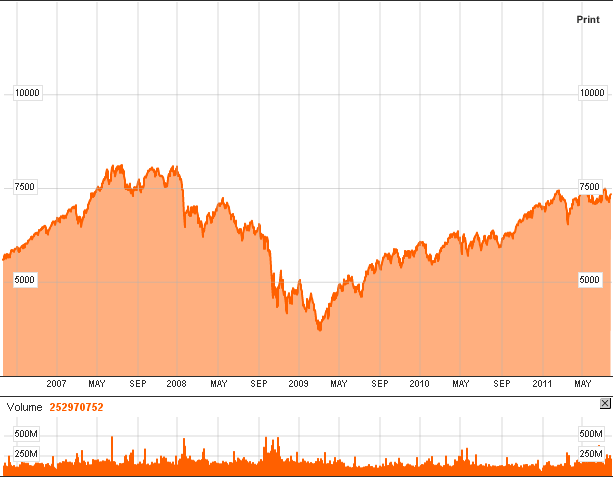

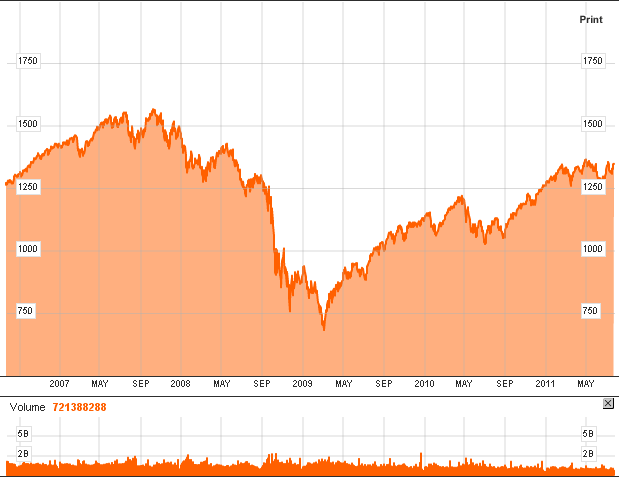
Maybe Ireland is a lead indicator here for other European countries seeking to deal with runaway debt?
Hi Mike,
I just discovered that your blog is back. That’s great.
I’m wondering how you view 13 week T-bills at this point.
I used to think I would hold them until either high interest rates signaled trouble or gold prices came back down to earth. I thought for sure that rising interest rates would come long before there was any risk to the 13-week bills. Now I’m wondering if that logic is sound.
Hi Bjorn – Why would there be any risk to T-bills? You mean because of this talk about default? I don’t think that is an issue at all at this point, just a scare tactic, since it would be very easy to suspend payments to some non-core government functions in order to make interest payments if the debt ceiling is not raised. But did you mean something else?
Of course, T-bills don’t have a coupon, so there is no interest payment, only principal. I’d still assign near zero risk to them.
No, I did not mean anything else. I just got rattled by the news of the day and started to wonder if the underlying rationale regarding the security of t-bills was still sound. Thanks, I appreciate your response.
For the sake of discussion, as we near the eleventh hour on the debt ceiling vote, if the debt ceiling were not raised this time around, or if we were to revisit a similar situation in the future and it is not raised, wouldn’t that mean that the Treasury Dept. would be unable to issue more T-Bills, Notes, and Bonds? And, might that not cause a kind of “run” on the Treasury Department as individuals and foreign governments make arrangements to redeem their short-term bills as soon as possible?
I understand the idea that there is no safer place for people to stash their cash right now, but if they begin to fear losing their principle it might cause them to rush to get their money out no matter what.
In such a run the government would be unable to come up with the cash. I don’t see the difference between that and a run on a bad bank.
This scenario would have seemed impossible to imagine a short time ago, at least I would have thought we would be knee-deep into a depression before it could happen. But this debacle has introduced a new level of stupidity, or evil intent, into the mix.
What would stop a run on the Treasury if the debt ceiling were not to be raised, either this time around or in the future?
It’s simple: make some cuts here and there from government departments and programs that we don’t need and few people would miss, like the departments of education, HUD, etc. Keep in mind that there IS revenue coming in every month, so we’d only have to cut a fraction of expenses to meet our debt obligations, and you can be sure that the financial elite would make the executive do this rather than default.
One other question to ask is, redeem their T-bills for what? Given that there would be no default, the total amount of T-bills would not shrink, so someone would buy whatever someone else panicked out of. So far, there are no signs of even mild worry – Treasuries soared on Friday and are up some more today.
Mike,
I don’t mean to drag this out, but your response helps to isolate a key point in this, I think.
“. . . the financial elite would make the executive do this rather than default.”
I see what you mean, but where are the finanical elite now. Just the drama alone, surrounding the vote, has helped to diminish the standing of the US in the eyes of the world. Why didn’t the elites make a phone call or two and set things straight before all of this got so drawn out?
Why are they playing it out to the very last minute?
Or, why are the elites allowing this drama to be played out to the last minute?
If the elites have such power maybe those in Washington already are doing what they’ve been told to do. If that’s the case then that would seem to introduce a conspiratorial factor into the equation. That’s the “evil intent” I was referring to. I hate going there, but it’s hard to see all of this as mere political theatre, as is being suggested by some in the news. The stakes seem way to high to be merely about political theatre.